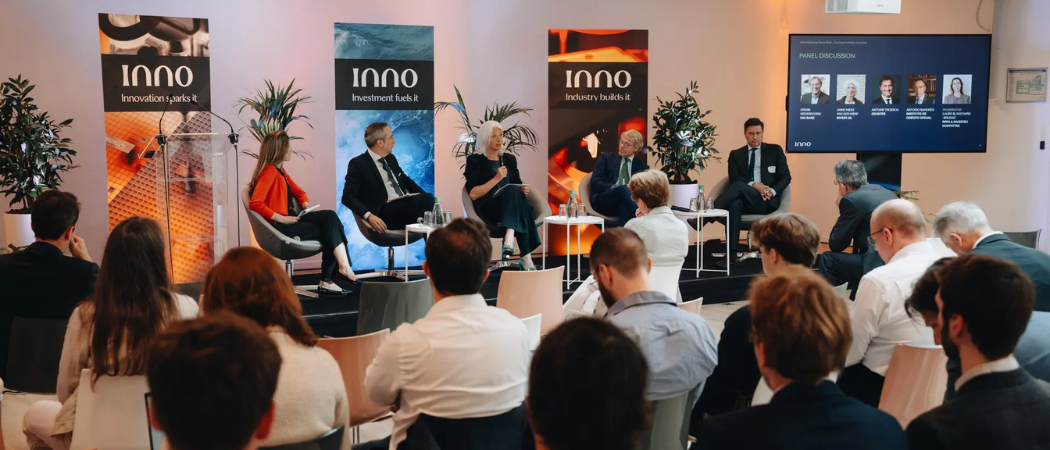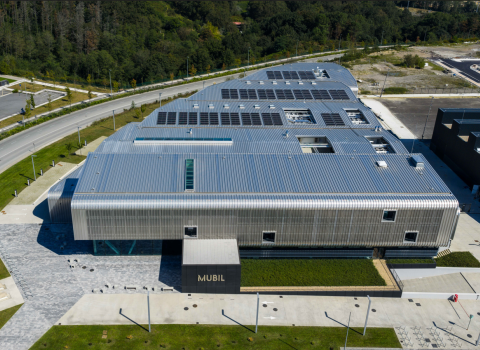European banks and institutions must offer more guarantees if investors are to choose high-risk clean technologies

Photo credits: InnoEnergy
European markets are keen on shifting to a low-carbon economy, but investors won’t jump in unless provided with more flexible, tailored financial tools to mitigate the risks, according to financial leaders.
“First of the kind projects, while groundbreaking, often struggle to attract private capital due to their high technological risks and unproven business models,” said Jean-Christophe Laloux, director general of the European Investment Bank (EIB). “Even successful innovative start-ups sometimes can’t afford their growth due to working capital constraints and are in need of guarantees to unlock access to affordable working capital facilities.”
Laloux was addressing an event organised by InnoEnergy, one of the European Institute of Innovation and Technology communities, in Brussels on June 3.
For Antonio Bandrés, head of international corporate finance at Instituto de Crédito Oficial, such guarantees are even more critical now that the increased use of artificial intelligence and robotics in clean technologies is making them more capital intensive.
He warned, however, that banks were faced with equity constraints, “because the regulation on the capital consumption, on the pricing [. . .] doesn’t really permit [them] to be flexible, to be active or to have a high-risk appetite.”
In its start-up and scale-up strategy, the European Commission proposes developing a Scaleup Europe Fund to make direct equity investments in strategic sectors such as cleantech. It also intends to develop a voluntary European Innovation Investment Pact with the EIB, which has itself announced plans to provide €70 billion in start-up funding by 2027.
While this is a good start, existing financial instruments must bring additional flexibility to meet scale-up needs.
Long-term guarantees
Invest-NL, for example, was able to mobilise €315 million in direct equity investments thanks to InvestEU guarantees, according to Anne Mieke van der Werf, who is responsible for business development at the Dutch investment agency. “This significantly enhanced our ability to take on risk and provide larger investments,” she said at the event.
This is also how her firm invested in Thorizon, a spin-off from the Dutch nuclear research institute NRG, which is developing a small nuclear reactor using long-lived radioactive waste as fuel.
She thinks, however, that the InvestEU Fund, which aims to trigger over €372 billion of investments using an EU budget guarantee of €26.2 billion, could become even more attractive to potential implementing partners. “Currently, the Commission requires a share of returns as compensation for the guarantee, but it does not provide liquidity, only covers funding and compliance costs,” she said.
Van der Werf also highlighted a specific challenge for those hoping to deploy new energy generating technologies. In order to do that, companies need to have power purchase agreements (PPAs), long-term contracts that guarantee a customer a fixed electricity price for a set period.
The problem is that many industrial companies in the Netherlands are not deemed sufficiently creditworthy to secure a PPA. “You need to provide guarantee structures for these off-takers [. . .] and then get the PPA secured by the banking system,” she explained.
According to Laloux, the EIB hopes to propose a solution to this problem this summer.
Related articles
- Viewpoint: innovation and collaboration are the pillars of Europe's cleantech leadership
- Hostile US environment for cleantech is an opportunity for Europe, experts say
Outside the InvestEU scheme, guarantees could take the form of standby letters of credit or performance bonds, Bandrés said. Both are issued by banks to protect one party to a contract against the failure of the other to meet its obligations.
Finally, Antoine Troesch, a managing partner at European investment group Demeter, underlined the importance of providing cleantech investors with market visibility, the ability to see what market conditions are likely in the months and years ahead. “If there is no market visibility, namely updates, certainty on prices and certainty on some costs, then there is no model,” he said.
Laloux also pointed out that “clear policy direction” was the precondition for investors to make their decisions. “We have seen in the United States this year what happens to investments when policy goes into reverse,” he added.





 A unique international forum for public research organisations and companies to connect their external engagement with strategic interests around their R&D system.
A unique international forum for public research organisations and companies to connect their external engagement with strategic interests around their R&D system.